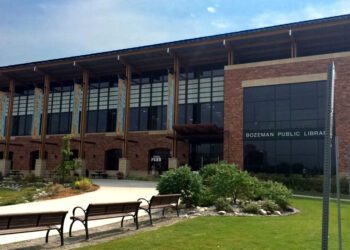A new pilot program at MSU-Billings looks to meet health care workforce demands by accelerating academic timelines.
By Alex Sakariassen MONTANA FREE PRESS
Spurred in part by ongoing staff shortages in Montana’s health care industry, the Montana University System is exploring ways to condense the academic timeline for certain college degrees and usher graduates into the state’s workforce more quickly.
A pilot program, which is currently under development with a target launch date in June 2023, would shrink the time required to obtain a traditional four-year bachelor’s degree to six or seven semesters over two calendar years. In the case of an associate’s degree, the goal is to condense the existing two-year timeline to three semesters. As MUS spokesperson Angela King told the Montana Board of Regents in announcing the pilot earlier this fall, these so-called sprint degrees would effectively make higher education a full-time undertaking for participants.
“This will take a lot of time and commitment on a student, and this will hopefully feel to the student like they are going to work every day, this is their job,” King said.
Deputy Commissioner of Higher Education Brock Tessman told Montana Free Press in October that Montana State University-Billings and its affiliated City College will serve as the initial test sites for the sprint degree pilot, with a first-year cohort of 30 to 50 students. The specific degrees that will be offered on an accelerated track have not yet been identified, but Tessman said early conversations with industry partners including Billings Clinic and St. Vincent Healthcare prompted the university system to focus the program on workforce shortages within the local health care community.
“Radiological technicians, surgical technicians, medical technicians — there are a lot of areas where they have a need,” Tessman said.
Josh Billstein, director of Billings Clinic’s Office of Strategic Planning and Development, said staffing issues have become particularly pronounced in recent years. Demand for services continues to rise as Montana’s population grows increasingly older. Meanwhile, the COVID-19 pandemic prompted some health care professionals to re-evaluate their careers, and hospitals across the country have struggled to retain staff or been forced to court new hires with signing bonuses. Billstein said certain specialty positions such as neurodiagnostic technologists have become “an acute need” at Billings Clinic and in the region.
“We looked at some of our most frequently open positions and those that were hard to fill and really used that to try and scope some of the conversation around where the highest impact could be from a health care perspective,” Billstein said of the clinic’s initial role in the sprint degrees conversation.
The types of degrees MUS is eyeing for the pilot involve not only in-class coursework but hands-on experience in clinical settings. They’re also overseen by separate accrediting organizations to ensure that student outcomes and academic quality are maintained. According to Sep Eskandari, MSU-Billings’ provost and vice chancellor for academic affairs, that means any new degree pathways developed as part of the pilot will have to secure support from the appropriate accrediting organization — one of several challenges he said the university is preparing to meet head-on.
“My hope is that within the next month, we can really have very clear direction from the accrediting bodies about one or two of these programs,” Eskandari said.
“We don’t want to try 10 programs and then let eight of them fail. We want to take one or two, be very intentional, do it well. And then once we have that formula, we can adapt as new needs are conveyed to us by our industry partners.”
SEP ESKANDARI, MSU-BILLINGS PROVOST AND VICE CHANCELLOR FOR ACADEMIC AFFAIRS
Eskandari predicts that the pilot’s accelerated timeline will also require MSU-Billings to begin offering certain core courses during the summer and offer special faculty advising for pilot participants. He added that the campus intends to keep the pilot contained to one associate’s degree and one bachelor’s degree to start, in the hope that the limited focus will produce better results that MSU-Billings and other campuses can later apply to other areas of high workforce demand.
“We don’t want to try 10 programs and then let eight of them fail. We want to take one or two, be very intentional, do it well,” Eskandari said. “And then once we have that formula, we can adapt as new needs are conveyed to us by our industry partners.”
The MUS pilot joins a growing list of initiatives around the state designed to respond to pressing economic needs. Over the past year, the University of Montana-based partnership Accelerate Montana has developed a series of rapid training programs for jobs in manufacturing, construction and health care. Accelerate Montana Director Paul Gladen said one of those programs, dubbed Job Site Ready, consists of 30 hours of online coursework and 15 hours of on-site experience, all culminating in entry-level employment. The partnership estimates that more than 450 Montanans will complete its rapid training programs by the end of 2022. Gladen believes many of those participants are people who may not have otherwise considered higher education.
“There’s a lot of people that are looking at academic programs and they’re saying, ‘You know what, I’m not sure I want to do a two-year degree or a four-year degree,” Gladen said. “It’s like, ‘Fine, let’s focus on training that can get you into a job. And maybe then you see the benefit of the training and education and want to do more of it.’”
Eskandari and Tessman expect the experimental sprint degrees to appeal to multiple groups of students, from high school seniors who want to forego the traditional college experience in favor of a fast track to a well-paying job to mid-career professionals seeking a new direction within their chosen industry. And overall, Eskandari said, an accelerated pathway should reduce the long-term cost of education for students as well. According to Billstein, Billings Clinic is even discussing ways to provide financial assistance to sprint degree students, since the rigors of the pilot likely preclude outside employment to help them pay for their studies.
“We’re definitely looking at some novel ways that we can support folks so that they don’t have to make some of those tough choices around loans and things like that,” Billstein said.
If successful, Tessman said, the sprint degrees pilot would serve a purpose well beyond the state’s immediate health care needs. He envisions the accelerated degrees as a “living portfolio” that can help campuses respond to the ever-evolving demands of Montana’s economy more broadly.
“It could be the case that there’s a three-year sprint in the allied health technical fields,” Tessman said. “And then maybe we make enough headway where those sunset a bit and what we really want is a sprint in the cybersecurity area in order to meet unmet demand there.”
Disclosure: Brock Tessman, deputy commissioner of academic, research and student affairs with the Office of the Commissioner of Higher Education, is married to MTFP deputy director Kristin Tessman. MTFP business staff do not have input into editorial coverage.














